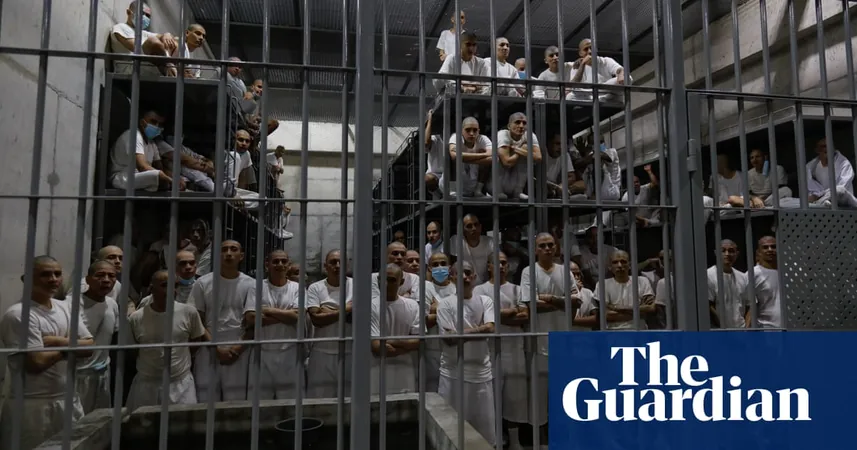
Alarming Link Between Tuberculosis Rates and Imprisonment in Latin America Exposed
2024-12-25
Author: Amelia
Introduction
A shocking new study reveals a direct connection between the soaring rates of tuberculosis (TB) in Latin America and the region's infamous prison overcrowding. As the global trend shows a decline in TB cases, Latin America experiences a staggering increase—indicating a public health crisis largely fueled by rising incarceration rates.
Study Overview
Published in the prestigious *Lancet Public Health* journal, the study highlights that, contrary to popular belief, HIV/AIDS is not the main driving factor behind TB infections in this region. Instead, the overwhelming factor is the significant rise in imprisonment. Researchers found that between 2015 and 2022, while worldwide tuberculosis cases fell by 8.7%, the incidence in Latin America surged by an alarming 19%.
Countries Analyzed
The research focused on six key countries—Brazil, Colombia, Mexico, Argentina, Peru, and El Salvador—which together account for nearly 80% of TB cases and prison populations in the region. The prison population within these nations skyrocketed from approximately 260,000 to over 1.3 million between 1990 and 2019.
Impact of Imprisonment
“About a third of all tuberculosis cases since 1990 can be traced back to incarceration in these countries,” stated Dr. Julio Croda, an infectious disease expert from Brazil’s Oswaldo Cruz Foundation (Fiocruz), one of the study’s contributors. This is particularly catastrophic in El Salvador, where an estimated 44% of TB cases in 2019 originated in prisons, a reality exacerbated by President Nayib Bukele's controversial measures leading to mass incarcerations.
Prison Conditions
The conditions within these prisons create a breeding ground for disease transmission. Patients in these facilities face TB rates 26 times higher than that of the general population. Dr. Croda notes that prisons are typically overcrowded, poorly ventilated, and often inhabited by individuals already facing risk factors for TB, including malnutrition and substance abuse.
Systemic Issues
Human Rights Watch’s Juan Pappier underscored the dire situation, attributing the dramatic spike in imprisonments to excessively harsh policies, particularly in the context of the 'war on drugs.' These misguided initiatives focus on low-level offenders rather than addressing systemic crime, culminating in stronger criminal networks within the prisons themselves.
Public Sentiment
Sociologist Julita Lemgruber emphasized the dangerous public sentiment that “punishment only counts if someone is put behind bars.” This mentality disregards the reality that the majority of those incarcerated will eventually be released, potentially spreading TB into communities where it can spiral out of control.
Projections and Recommendations
The study’s projections are staggering. Had imprisonment rates remained stable since 1990, researchers believe the six countries would have reported at least 34,393 fewer TB cases in 2019—accounting for over a quarter of total cases that year. A proposed reduction in prisoner intake could lead to a 10% drop in TB incidence across most countries by 2034.
Long-term Recovery Needs
Unfortunately, even a swift halt to extreme state measures in places like El Salvador would require years of recovery efforts to regain lost public health ground. Pappier advocates for more thoughtful strategies targeting criminal leaders rather than mass incarcerations, along with alternative sentencing for non-violent offenders.
Improving Prison Health Services
Dr. Croda agrees that reducing the prison population is crucial, but he also insists on the immediate need for improved prison conditions. He explains how most TB cases in penitentiaries go unreported due to a lack of diagnostic testing, as adequate health services often fail to reach these vulnerable populations.
Conclusion
The evidence presented in this study is a wake-up call for policymakers, health officials, and society at large: tackling the tuberculosis crisis in Latin America requires a fundamental reevaluation of the prison system and its intersection with public health. Without urgent action, this dual crisis will only worsen, putting millions of lives at risk.









 Brasil (PT)
Brasil (PT)
 Canada (EN)
Canada (EN)
 Chile (ES)
Chile (ES)
 España (ES)
España (ES)
 France (FR)
France (FR)
 Hong Kong (EN)
Hong Kong (EN)
 Italia (IT)
Italia (IT)
 日本 (JA)
日本 (JA)
 Magyarország (HU)
Magyarország (HU)
 Norge (NO)
Norge (NO)
 Polska (PL)
Polska (PL)
 Schweiz (DE)
Schweiz (DE)
 Singapore (EN)
Singapore (EN)
 Sverige (SV)
Sverige (SV)
 Suomi (FI)
Suomi (FI)
 Türkiye (TR)
Türkiye (TR)